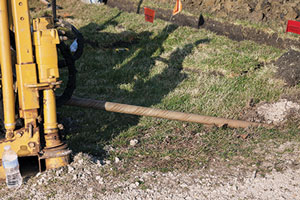Fluids Handling, Safety in Horizontal Drilling Have Evolved

|
| Some newer contracts for HDD projects go so far as to require 100 percent containment for all equipment and fluids. This could even include collecting any rain that came into contact with drilling equipment. |
Let’s start with drilling fluid. In the past pretty much “anything goes” was the norm when discussing drilling mud for HDD installations. If a contractor was drilling under a river, many times the river water would be used to mix the drilling mud. Not anymore. Most contracts now specify that the water used for the drilling fluid must come from a potable source. This means water must be hauled from a fire hydrant or other approved drinking water source. Another change centered around drilling fluid is the type of mud and additives that can be utilized. Many HDD contractors are required to utilize drilling fluids and/or additives that are NSF 60 approved. The NSF 60 certification sets health effects criteria for many water treatment chemicals including well drilling aids (drilling fluids). This means that some drilling fluids/additives that inhibit clay swelling or increase viscosity/gel strength may not be acceptable for use in a horizontal bore drilled for a pipeline installation, and others that are important to control loss of fluids are simply not allowed.
How contractors handle/control the mud during and after the drilling process is also a major issue during HDD projects. In the past, it was common to leave the drilling fluids and spoils on the pipeline right of way (ROW) or find a local farmer to accept the cuttings. Additionally, standard practice years ago was for the pipeline company to be responsible for the excess drilling fluids and spoils. Fast forward to 2014 and in most instances the HDD contractor is required by contract to remove the drilling fluids and spoils, and dispose of the waste in a well-documented and legal manner. This means that now the horizontal driller is responsible for containment, solidification, transport and disposal of all drilling generated waste from the project. This can be a very expensive item for the contractor, especially in remote drilling locations.
Containment of inadvertent returns (frack outs) is now a very important part of the HDD contractor’s job. Even though the drilling fluids and additives are NSF 60 approved, fluids leaking to the ground surface are treated as a toxic substance. In the past, frack outs were treated as a nuisance, “keep drilling and clean up the mess later” was the norm. Most contracts today require an “IR plan” (inadvertent return plan) that details the exact steps the contractor will take if drilling fluids appear at the surface. Supplies necessary to handle the IR must be on site and, often, the IR plan may require one member of the crew to continuously walk the bore path to observe and report any inadvertent returns. The IR plan also must fully detail plans in case the drilling fluid appears in the stream, wetland or river being drilled.
Environmental issues are also significant change from the past. Many years ago, I watched a crew change oil in the drilling and support equipment on the site and dump the old oil on the ground. Not anymore. A recent contract reviewed by an HDD contractor called for 100 percent containment for all operating engines/equipment on the site. This included plastic sheeting under all equipment to capture any fluid leaks (hydraulic, fuel, engine oil) that may occur during the project. The containment plan also included provisions to catch and contain all stormwater (rain) that came into contact with the drilling equipment. This type of requirement can be a quite a challenge on a long crossing with many large pieces of equipment on site.
Finally, health and safety training and safe work practices are being required for HDD contractors. “Just show up and start the engines” is becoming a thing of the past. Large pipeline contractors and owners are expecting that the HDD contractor employees are trained in the safe operation of the equipment and understand the requirements of a safe workplace. Drillers are required to hold tailgate safety meetings (actually have the meeting, not “pencil whip” the form). In some instances, the pipeline company inspector will attend and contribute to the daily safety meeting. Drug testing is also required by many contracts these days and random testing may be part of the contract.
We just discussed how HDD projects have changed over the last several years. Do all projects have the requirements detailed above? Of course not. However we are seeing a fundamental change in the HDD business to a more professional, environmentally conscious, safer industry. Horizontal directional drilling contractors with the attitude, “that’s not the way I did it in the past, why change?” are not going to survive the maturation of the industry. They must embrace the changes or risk being left behind.
David S. Bardsley is business development manager for Directed Technologies Drilling. For more Bardsley columns, visit www.thedriller.com/bardsley.
Looking for a reprint of this article?
From high-res PDFs to custom plaques, order your copy today!



